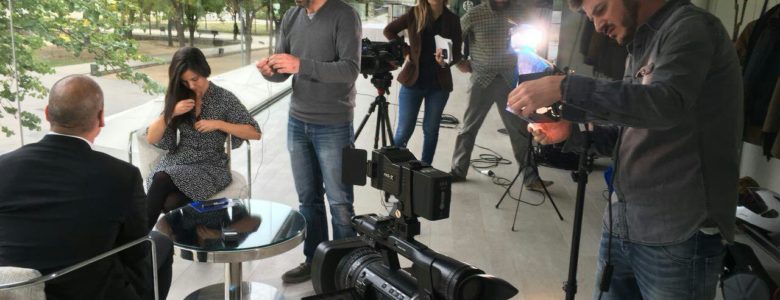
"Catalonia is a European problem demanding a European solution" – Yanis Varoufakis
At a press conference this morning in Barcelona, DiEM25 co-founder Yanis Varoufakis presented a proposal for a European response to the Catalan crisis – one which is to be discussed by our movement’s members so that DiEM25 tables a formal pan-European policy proposal on the issue of regions seeking statehood.
Here’s Yanis’ full statement:
The EU’s response to the crisis in Catalonia has been hypocritical (it has intervened in the ‘internal affairs’ of Greece, Ireland, Italy etc.) and logically incoherent (by hiding behind the claim that it is a union of states, it motivates Catalan statehood). Moreover, the EU has been responsible for stoking the discontent that led to the current crisis in Catalonia – through austerity and large bankers’ bailouts. The time has come to Europeanise the solution to a problem that is European in both its nature and causes.
Any regional government requesting the EU’s support in staging a legally binding independence referendum must comply with these six conditions:
- The region’s elections must first be won (with an absolute majority of the voters) by a party (or a coalition of parties) proposing such a referendum.
- Any subsequent referendum should be held, in coordination with the EU at the earliest one year after that election, to allow for a proper, sombre debate.
For the EU to sanction the referendum, and for continued membership of the Union by any new state emerging from such a referendum, the constitution of the new state must commit to:
- Guaranteeing freedom of movement between the new state and the rest of the European Union, including of course the rest of the ‘old’ country
- Affording its citizens the right to (but no imposition of) citizenship of the new state, the ‘old’ country and/or the European citizenship.
- Working together with European authorities to maintain at least the same level of fiscal transfers to the rest of the country in the form of investment funding that is channelled, under the supervision of European institutions (including the European Investment Bank, and its offshoot the European Investment Fund), into the poorer regions of the old country.
- Working together with European authorities to eliminate any trade surplus or deficit with the ‘old’ country as well as other EU member-states.
No one has the right to prohibit citizens of a European region from aspiring to statehood. At the same time, no region can aspire to statehood and, at once, to membership of a democratic, well-functioning European Union without respecting the basic principles of a democratic, well-functioning European Union.
A longer version of Yanis’ proposal to trigger a DiEM25 membership-wide discussion is now available here.
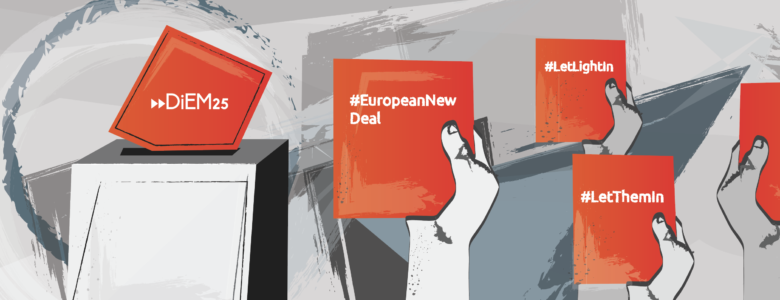
DiEM25 prepares to compete in elections
The results are in: With 72.98% turnout, our members voted an overwhelming ‘YES!’ to whether DiEM25 should be able to compete in elections. This vote is the result of an immense exercise of consensus building after months of passionate internal debate, hundreds of amendments and proposals from members across the world, two Facebook Live chats, a Q+A, and several articles.
Crucially, this does not mean our movement will transform into a political party — rather, we now have the option of being both! Today’s decision is a go-ahead from our members to set up an ‘electoral wing’, with which we may compete in future elections. DiEM25 members do not have to join our electoral efforts if they prefer not to… but every DiEM25 member will continue to take part in shaping DiEM25 policies across Europe!
So what’s our next step? While the Establishment arrests politicians in Catalonia and artists in Serbia, and looks the other way while the rich evade taxes, we continue to build alliances with progressive political actors at all levels — national, municipal and regional — to bring our European New Deal proposals to ‘a ballot box near you’. Like Razem in Poland, The Alternative in Denmark, the Czech Republic (where two of our members were recently elected to parliament) and progressive politicians in Italy, France, Spain, Croatia and beyond.
But now, empowered by our members’ landmark decision today, we’re also poised to potentially register political parties in key battlegrounds where alliances may not be possible or desirable.
As ever, our members will decide. Thanks to all who voted. These difficult times just became a little more hopeful — join us and let’s take back Europe!
(Quick details of the vote: Only full members who verified their identity, accessed their account in the last three months and joined us before the vote was called, could vote. The total number of people that fit this criteria were 8,312, out of 60,000 total members. Turnout was 72.98%, therefore 6,066 people.)

The Paradise Papers are much more revealing than people think
Nobody is surprised anymore by leaks that uncover how the world’s richest people stash their money in tax havens. In 2016 we saw the Panama Papers, and now we have a new leak: the Paradise Papers, naming the Queen of England, US president Donald Trump, the Russian state, multinational giants and celebrities but also showing the connections between them.
The real scandal, as Glenn Greenwald said after the Panama papers came out, is that all these actions are legal. We are not surprised because we are fully aware of the lack of transparency among the powerful, the rich and governments. This is a direct consequence of our faded or absent democracies: people have limited electoral power, especially within the EU.
The Snowden revelations, and the Panama and Paradise papers, show us what we’re up against. Keeping legal loopholes for these tax havens is not only unethical, but offers only an economic benefit to those hiding their money away. Tax havens are yet another example of the EU keeping the status quo, looking away while allowing elites continue their extractive behaviour.
The EU must set the example and end tax havens in its members’ peripheral territories. All options to do this should be kept on the table: seizure of assets, travel bans and capital controls.
But decision makers won’t do this on their own — we need to push them to do it, to organise to make the alternative a reality. At DiEM25, we are struggling for a fair and democratised EU. We want to have you on board and hear your views… so that the next Paradise papers find us even more united!
Aris is a member and volunteer of the DiEM25 movement.
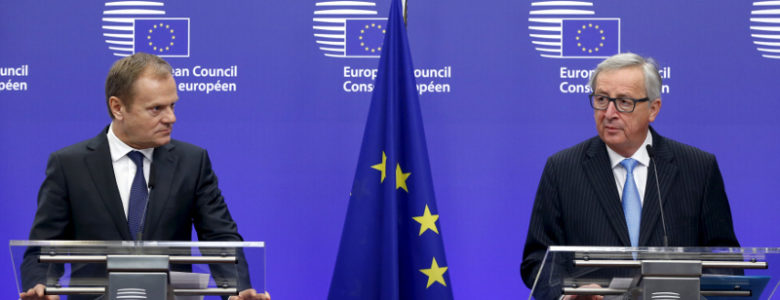
Upholding the Rule of Law in the European Union
An open letter concerning the upholding of the Rule of Law in the European Union, co-signed by 188 scholars, politicians, public intellectuals and members of the European Parliament and sent on November 3, 2017. Among the signatories, DiEM25 co-founder, Yanis Varoufakis and DiEM25 Advisory Panel members Barbara Spinelli and Sandro Mezzadra.
OPEN LETTER
COMMISSION PRESIDENT JUNCKER
EUROPEAN COUNCIL PRESIDENT TUSK
cc. First Vice-President Frans Timmermans
On upholding the rule of law in the European Union
3 November 2017
Dear President Juncker, dear President Tusk:
We are scholars, politicians, public intellectuals and members of the European Parliament writing to you with the following concern:
The European Union has proclaimed the Rule of Law principle and respect for fundamental rights and freedoms to be binding on its Member States (Articles 2 and 6 of the Lisbon Treaty). The EU’s leadership has been a staunch protector of these fundamental norms, most recently in countering the Polish government’s attempts to undermine the independence of judges as well as the Hungarian government’s actions to limit civil society and media freedoms.
However, we are deeply concerned that the EU’s governing bodies are condoning the violation of the Rule of Law in Spain, in particular regarding the Spanish central authorities’ approach to the 1 October referendum on Catalan independence. We do not take political sides on the substance of the dispute on territorial sovereignty and we are cognizant of procedural deficiencies in the organisation of the referendum. Our concern is with the Rule of Law as practised by an EU Member State.
The Spanish government has justified its actions on grounds of upholding or restoring the constitutional order. The Union has declared that this is an internal matter for Spain. Issues of national sovereignty are indeed a matter of domestic politics in liberal democracies. However, the manner in which the Spanish authorities have been handling the claims to independence expressed by a significant part of the population of Catalonia constitutes a violation of the Rule of Law, namely:
1/ The Spanish Constitutional Tribunal banned the referendum on Catalan independence scheduled for 1 October, as well as the Catalan Parliament session scheduled for 9 October, on grounds that these planned actions violate Article 2 of the Spanish Constitution stipulating the indissoluble unity of the Spanish nation, thus rendering secession illegal. However, in enforcing in this way Article 2, the Tribunal has violated Constitutional provisions on freedom of peaceful assembly and of speech – the two principles which are embodied by referendums and parliamentary deliberations irrespective of their subject matter. Without interfering in Spanish constitutional disputes or in Spain’s penal code, we note that it is a travesty of justice to enforce one constitutional provision by violating fundamental rights. Thus, the Tribunal’s judgments and the Spanish government’s actions for which these judgments provided a legal basis violate both the spirit and letter of the Rule of Law.
2/ In the days preceding the referendum, the Spanish authorities undertook a series of repressive actions against civil servants, MPS, mayors, media, companies and citizens. The shutdown of Internet and other telecom networks during and after the referendum campaign had severe consequences on exercising freedom of expression.
3/ On referendum day, the Spanish police engaged in excessive force and violence against peaceful voters and demonstrators – according to Human Rights Watch. Such disproportionate use of force is an undisputable abuse of power in the process of law enforcement.
4/ The arrest and imprisonment on 16 October of the activists Jordi Cuixart and Jordi Sànchez (Presidents, respectively, of the Catalan National Assembly and Omnium Cultural) on charges of sedition is a miscarriage of justice. The facts resulting in this incrimination cannot possibly be qualified as sedition, but rather as the free exercise of the right to peaceful public manifestation, codified in article 21 of the Spanish Constitution.
The Spanish government, in its efforts to safeguard the sovereignty of the state and indivisibility of the nation, has violated basic rights and freedoms guaranteed by the European Convention on Human Rights, the Universal Declaration of Human Rights, as well as by Articles 2 and 6 of the basic law of the EU (the Lisbon Treaty). The violation of basic rights and freedoms protected by international and EU law cannot be an internal affair of any government. The silence of the EU and its rejection of inventive mediation is unjustifiable.
The actions of the Spanish government cannot be justified as protecting the Rule of Law, even if based on specific legal provisions. In contrast to rule-by-law (rule by means of norms enacted through a correct legal procedure or issued by a public authority), Rule of Law implies also the safeguarding of fundamental rights and freedoms – norms which render the law binding not simply because it is procedurally correct but enshrines justice. It is the Rule of Law, thus understood, that provides legitimacy to public authority in liberal democracies.
We therefore call on the Commission to examine the situation in Spain under the Rule of Law framework, as it has done previously for other Member States.
The EU leadership has reiterated that violence cannot be an instrument in politics, yet it has implicitly condoned the actions of the Spanish police and has deemed the actions of the Spanish government to be in line with the Rule of Law. Such a reductionist, maimed version of the Rule of Law should not become Europe’s new political common sense. It is dangerous and risks causing long-term damage to the Union. We therefore call on the European Council and Commission to do all that is necessary to restore the Rule of Law principle to its status as a foundation of liberal democracy in Europe by countering any form of abuse of power committed by Member States. Without this, and without a serious effort of political mediation, the EU risks losing its citizens’ trust and commitment.
The crisis has in the meantime developed further (the Catalan government was detained, arrest warrant was issued against Mr Puigdemont). We follow closely the situation with the interests of democracy in Catalonia, Spain and Europe in mind, as they cannot be separated, and we insist all the more on the importance for the EU to monitor the respect of fundamental freedoms by all parties.
***
On the initiative of Albena Azmanova (University of Kent) and Barbara Spinelli (writer, Member of the European Parliament)
Co-signatories (in personal capacity):
Etienne Balibar, université Paris Nanterre and Kingston University London
David Gow, editor, Social Europe
Kalypso Nicolaidis, Oxford University, Director of the Center for International Studies
Mark Davis, University of Leeds, Founding Director of the Bauman Institute
Cristina Lafont, Northwestern University (Spanish citizen)
Ash Amin, Cambridge University
Yanis Varoufakis, DiEM25 co-founder
Rosemary Bechler, editor, openDemocracy
Gustavo Zagrebelsky professor of constitutional law, University of Turin
Antonio Negri, Philosopher, Euronomade platform
Costas Douzinas, Birkbeck, University of London
Robert Menasse, writer, Austria
Dimitrios Papadimoulis, Vice President of the European Parliament (GUE-NGL)
Ulrike Guérot, Danube University Krems, Austria & Founder of the European Democracy Lab, Berlin
Judith Butler, University of California, Berkeley and European Graduate School, Switzerland
Philip Pettit, University Center for Human Values, Princeton University (Irish citizen)
Josep-Maria Terricabras, Member of European Parliament (Greens/EFA)
Hauke Brunkhorst, University of Flensburg
Judit Carrera, Centre for Contemporary Culture of Barcelona
Gabriele Zimmer, Member of European Parliament (President, GUE/NGL)
Philippe Schmitter, European University Institute, Florence
Bart Staes, Member of European Parliament (Flemish Greens)
Marie-Christine Vergiat, Member of European Parliament (GUE-NGL)
Jón Baldvin Hannibalsson, former minister for foreign affairs and external trade of Iceland
Diana Wallis, former Vice President of the European Parliament
Craig Calhoun, President, Berggruen Institute; Centennial Professor at the London School of Economics and Political Science (LSE)
Jane Mansbridge, Kennedy School of Government, Harvard University
Josu Juaristi Abaunz, Member of European Parliament (GUE-NGL)
Alyn Smith, Member of the European Parliament (Greens/EFA)
Thor Gylfason, University of Iceland and Research Fellow at CESifo, Munich/former member Iceland Constitutional Council 2011
Jordi Solé, Member of European Parliament (Greens/EFA)
Judith Revel, Université Paris Nanterre
Seyla Benhabib, Yale University; Catedra Ferrater Mora Distinguished Professor in Girona (2005)
Arjun Appadurai, Institute for European Ethnology, Humboldt University, Berlin
Susan Buck-Morss, CUNY Graduate Center and Cornell University
Ramon Tremosa i Balcells, Member of European Parliament (Alde)
Anastasia Nesvetailova, Director, City Political Economy Research Centre, City University of London
Nancy Fraser, The New School for Social Research, New York (International Research Chair in Social Justice, Collège d’études mondiales, Paris, 2011-2016)
Jill Evans, Member of the European Parliament (Greens/EFA)
Regina Kreide, Justus Liebig University, Giessen
Jodi Dean, Hobart and William Smith Colleges, Geneva NY
Tatjana Zdnoka, Member of the European Parliament (Greens/EFA)
Wendy Brown, University of California, Berkley
Roberta De Monticelli, University San Raffaele, Milan.
Sophie Wahnich, directrice de recherche CNRS, Paris
Christoph Menke, University of Potsdam, Germany
Tanja Fajon, Member of the European Parliament (S&D)
Robin Celikates, University of Amsterdam
Eric Fassin, Université Paris-8 Vincennes – Saint-Denis
Paul Molac, Member of the French Parliament (écologiste)
Alexis Cukier, Université Paris Nanterre
Diogo Sardinha, university Paris/Lisbon
Luke Ming Flanagan, Member of the European Parliament (GUE-NGL)
Dario Castiglione, University of Exeter
Hamit Bozarslan, EHESS, Paris
Frieder Otto Wolf, Freie Universität Berlin
Gerard Delanty, University of Sussex
Boaventura de Sousa Santos, Coimbra University and University of Wisconsin-Madison
Sandro Mezzadra, Università di Bologna
Camille Louis, University of Paris 8 and Paris D
Philippe Aigrain, writer and publisher
Yann Moulier Boutang and Frederic Brun, Multitudes journal
Anne Querrien and Yves Citton, Multitudes journal
Bruce Robbins, Columbia University
Michèle Riot-Sarcey, université Paris-VIII-Saint-Denis
Zeynep Gambetti, Bogazici University, Istanbul (French citizen)
Andrea den Boer, University of Kent, Editor-in-Chief, Global Society: Journal of Interdisciplinary International Relations
Moni Ovadia, writer and theatre performer
Merja Kyllönen, Member of the European Parliament (GUE/NGL)
Guillaume Sibertin-Blanc, Université Paris 8 Saint-Denis
Peter Osborne, Centre for Research in Modern European Philosophy, Kingston University, London
Ilaria Possenti, University of Verona
Nicola Lampitelli, University of Tours, France
Yutaka Arai, University of Kent
Enzo Rossi, University of Amsterdam, Co-editor, European Journal of Political Theory
Petko Azmanov, journalist, Bulgaria
Etienne Tassin, Université Paris Diderot
Lynne Segal, Birkbeck College, University of London
Danny Dorling, University of Oxford
Maggie Mellon, social policy consultant, former executive member Women for Independence
Vanessa Glynn, Former UK diplomat at UKRep to EU
Alex Orr, exec mbr, Scottish National Party/European Movement in Scotland
Bob Tait, philosopher, ex-chair Langstane Housing Association, Aberdeen
Isobel Murray, Aberdeen University
Grahame Smith, general secretary, Scottish Trades Union Congress
Igor Šoltes, Member of the European Parliament (Greens/EFA)
Pritam Singh, Oxford Brookes University
John Weeks, SOAS, University of London
Jordi Angusto, economist at Fundació Catalunya-Europa
Leslie Huckfield, ex-Labour MP, Glasgow Caledonian University
Ugo Marani, University of Naples Federico II and President of RESeT
Gustav Horn, Scientific Director of the Macroeconomic Policy Institute of the Hans Böckler Stiftung
Chris Silver, journalist/author
François Alfonsi, President of EFA (European Free Alliance)
James Mitchell, Edinburgh University
Harry Marsh, retired charity CEO
Desmond Cohen, former Dean, School of Social Sciences at Sussex University
Yan Islam, Griffith Asia Institute
David Whyte, University of Liverpool
Katy Wright, University of Leeds
Adam Formby, University of Leeds
Nick Piper, University of Leeds
Matilde Massó Lago, The University of A Coruña and University of Leeds
Jim Phillips, University of Glasgow
Rizwaan Sabir, Liverpool John Moores University
Pablo Ciocchini, University of Liverpool
Feyzi Ismail, SOAS, University of London
Kirsteen Paton, University of Liverpool
Stefanie Khoury, University of Liverpool
Xavier Rubio-Campillo, University of Edinburgh
Joe Sim, Liverpool John Moores University
Paul Molac, Member of the French Parliament
Hannah Wilkinson, University of Keele
Gareth Dale, Brunel University
Robbie Turner, University of St Andrews
Will Jackson, Liverpool John Moores University
Louise Kowalska, ILTUS Ruskin University
Alexia Grosjean, Honorary member, School of History, University of St Andrews
Takis Hadjigeorgiou, Member of the European Parliament (GUE-NGL)
Paul McFadden, York University
Matthias E. Storme, Catholic University of Leuven
Phil Scraton, Queen’s University Belfast
Oscar Berglund, University of Bristol
Michael Lavalette, Liverpool Hope University
Owen Worth, University of Limerick
Ronnie Lippens, Keele University
Zoë Dingwall, political adviser EFA (European Free Alliance)
Andrew Watterson, Stirling University
Steve Tombs, The Open University
Emily Luise Hart, University of Liverpool
David Scott, The Open University
Anders Eriksson, bureau EFA (European Free Alliance), European Parliament
Bill Bowring, Birkbeck College, University of London
Sofa Gradin, King’s College London
Michael Harrison, University of South Wales
Ana Manzano-Santaella, University of Leeds
Noëlle McAfee, Emory University
Peter J. Verovšek, University of Sheffield
Peter Dews, University of Essex
Martin Matuštík, Arizona State University
Camil Ungureanu, Pompeu Fabra University, Barcelona
Dafydd Huw Rees , Cardiff University
Patrick Le Hyaric, Member of the European Parliament (GUE-NGL)
Hans-Peter Krüger, University of Potsdam
Loren Goldman, University of Pennsylvania
Federica Gregoratto, University of St.Gallen
Rurion Soares Melo, Universidade de São Paulo
Pieter Duvenage, Cardiff University and editor, Journal for Contemporary History
Chad Kautzer, Lehigh University
Peter A. Kraus, University of Augsburg
David Ingram, Loyola University of Chicago
Alain-G. Gagnon, Université du Québec à Montréal
Peter Bußjäger, Institut für Föderalismus, Innsbruck
Nelly Maes, Former Member of the European Parliament, former President of European Free Alliance
Helmut Scholz, Member of the European Parliament (GUE/NGL)
Michel Seymour, Université de Montréal
Simon Toubeau, University of Nottingham
Georg Kremnitz, Universität Wien
Keith Gerard Breen, Queen’s University Belfast
Alan Price, Swansea University
Fernando Ramallo, Universidade de Vigo
Nicolas Levrat, University of Geneva, Director of the International Law Department
Jordi Matas, Professor of Political Science, University of Barcelona
Simon Toubeau, University of Nottingham
María Pilar García Negro, University of Coruña
María do Carme García Negro, University of Santiago de Compostela
Francisco Rodríguez, writer
Carme Fernández Pérez-Sanjulián, University of Coruña
Patrice Poujade, Université de Perpignan
Colin H Williams, Cardiff and Cambridge University
Nicolas Berjoan, Université de Perpignan
Joan Peitavi, Université de Perpignan
Alà Baylac-Ferrer, Université de Perpignan
Guglielmo Cevolin, University of Udine
Robert Louvin, Professor of Comparatve Law, University of Calabria
Günther Dauwen, Secretary General of the Centre Maurits Coppieters
Bart Maddens, Catholic University of Leuven
Alan Sandry, Swansea University
Justo Serrano Zamora, Bavarian School of Public Policy
Ivo Vajgl, Member of the European Parliament (Alde)
Alberto Aziz Nassif, Centro de Investigaciones y Estudios Superiores en Antropología Social, México
Sandrina Antunes, University of Minho, Portugal
Pablo Beramendi, Duke University
Nico Krisch, Graduate Institute of International and Development Studies, Geneva
Miguel Urbán Crespo, Member of the European Parliament (GUE/NGL)
Yasha Maccanico, University of Bristol and “Statewatch”
Thierry Dominic, l’Université de Bordeaux
Richard Norton-Taylor writer on defence and security, trustee of Liberty
Paola Pietrandrea, Université François Rabelais de Tours, and DiEM25
Josep Ramoneda, philosopher and writer, Catalonia/Spain
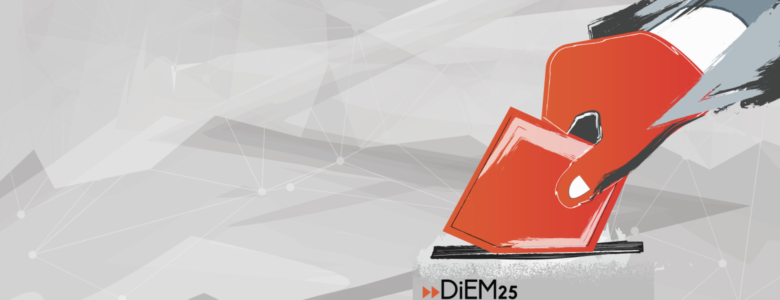
Taking DiEM25’s progressive agenda to the ballots: proponents make their case
We’re only a few days away from the most important decision since our movement launched in 2016: Should we establish an ‘electoral wing’, which will enable us to compete in elections and bring our Progressive Agenda to ballots across Europe? The vote is underway (deadline: Tuesday!), and every DiEM25 member can have their say.
While there is ample information on this vital matter in the form of articles and videos in our site, and a passionate debate is going on in our forum and social media channels, our Coordinating Collective (CC) wants to give us as much information as possible to help members decide. Therefore, we approached the authors of the proposals currently up for vote and asked them to provide further insight on their proposals.
Our plan was to record a video debate among the proponents, with members asking questions. Unfortunately, because of technical difficulties, ensuring the presence of all proponents proved impossible. Hosting a debate without all four proposal authors present would have been unfair.
So we’re going for the next best thing: a common set of questions to allow proponents to further explain their ideas and why they believe their proposal is best for DiEM25 to take its fight with the Establishment to the electoral arena. Visit our forum and take part in the discussion now!
This is a major step for our movement, for it will allow us to take our fight to another level.
But democracy starts at home, and this is a decision we must make together. So log into the Members Area now to make your voice heard!
Carpe DiEM!

Our climate crisis is also a crisis of democracy and imagination
The climate crisis is the greatest challenge of our time. If we are to combat it, we need to realize that we can only do so through collective, democratic action combined with the will to build a better future for everything that lives on this planet.
Just a few miles away from where the international community will gather on Monday for the 2017 UN Climate Change Conference, in Bonn, massive ecological destruction (like drawdown, mercury emissions, and fine dust pollution) is taking place. As Naomi Klein, a friend to DiEM25 stated, those most affected by the outcomes of disasters related to our global climate crisis have no space to make their voices heard in gatherings like these. Our local economic behavior shows its most drastic outbreaks in other parts of the world.
In Europe´s greatest brown coal strip mining though, business will go on as usual. The extraction of coal worldwide destroys local livelihoods, ecosystems and entire landscapes. The fossil industry encourages human rights violations, like the annihilation of workers’ rights. Power generation from brown coal is responsible for massive CO2 emissions, which threaten our climate globally.
In public discourse, Germany and Merkel are often perceived as the rock-solid, leading-edge guarantor of sustainable climate governance. But that is a twisted truth: while Germany did go through a phase of reducing CO2 emissions until 2011, we are now seeing a rise in CO2 levels, mostly due to rising levels of electricity production from coal.
Germany will not reach its climate goals, if it doesn’t soon radically reduce the production of coal power. The same goes for Europe. According to the International Energy Agency, Europe must reduce its share of coal-power from 25% to about 4% until 2035.
In response to this dreadful reality, a growing climate movement will respond with a Demo, a People´s Climate Summit and with peaceful acts of civil disobedience. Activists will be occupying Europe´s greatest coal mine, shifting attention to the real site of decision-making.
Meanwhile, in the city of Munich, an active coalition of engaged citizens and organizations has also taken action. A citizen-led campaign, #Raus-aus-der-Steinkohle, was launched two years ago to end the production of electricity and heat from a local coal-fired power plant (HKW München Nord Block 2) — a plant that produces more CO2 emissions than the entire city traffic! Surveys show that a swift solution is possible, since the conditions for a transition to geothermal energy are optimal in the Munich area. The expansion is stagnating, an activist tells me, as the power plant is blocking the way. Profit over people isn´t just a slogan.
On November 5, Munich citizens will vote in a referendum on whether to exit the power production from coal for their city by 2022. We support our friends from #Raus-aus-der-Steinkohle for taking action in this important decision.
The density and severity of this year’s climate catastrophes are incommensurable to any monetary argument. They should be a wake-up call to all progressive Europeans. The outdated concept of solving problems by creating markets — like so-called ‘emissions trading’ — is inadequate. The Catalan question has shown that Europe needs a different perspective, and the same is true for our climate crisis. We aim to find a third way. We need to challenge our collective imagination!
In this severe and threatening crisis, we cannot obey individual interest or hide behind theoretical debates while losing sight of the greater picture. While this crisis was created by a complex of problems, historical contingencies and economic practice, far-reaching solutions and diverse forms of action are needed, that include the perspective of climate justice.
We encourage our fellow DiEMers across Munich and beyond to raise their voices on November 5 for #Raus-aus-der-Steinkohle, and encourage our friends across Europe to take similar action in their communities.
Elisa is a member and volunteer of the DSC Munich.
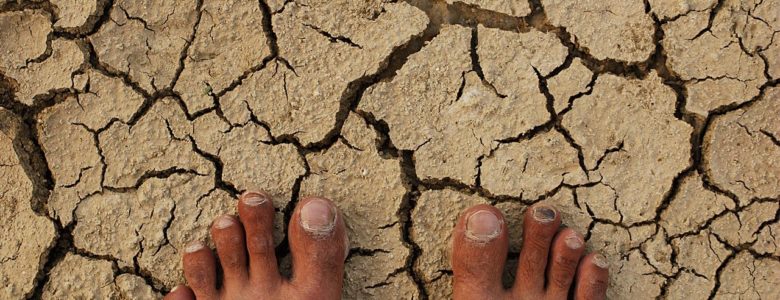
Fighting poverty should not derail environmental goals
Two vital pillars of the DiEM25 European New Deal are poverty alleviation and heavy investment in green technologies. Though these two fields may seem unconnected, new scientific studies suggest there are solid links between them. Scientists argue that the more we fight poverty and help people, the more carbon emissions will rise. This means that humanity should also do more to fight climate change.
However, this topic is far too much of a political hot potato to be left in the hands of academics. We believe that poverty (worldwide and now, unfortunately, within the EU too, made worse by the troika), and climate change are two vital issues that should define the EU and the global political framework. Therefore, a transition to green technologies is urgently needed in every country.
But this is only the first of the two necessary steps. The second is that every new investment should obey high environmental and sustainability standards. This is much needed in developing countries, where world leaders should think and plan ahead to eliminate poverty effectively without damaging the measures taken to combat global warming. Scientists have shown us the way forward. We now need to unite so we can do better than their models are predicting.
Aris is a member and volunteer of the DiEM25 movement.
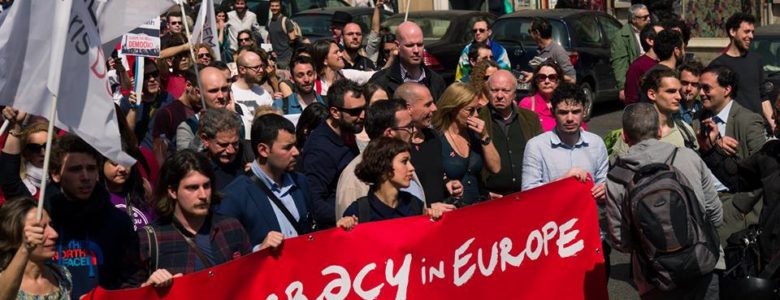
DiEM25 : The Left is dead, long live the Left !
The crisis in which the European Left finds itself is not only a political crisis: it is also, and even above all, the crisis of the Left’s social base. Broadly speaking, such a crisis coincides with that of society, i.e. of the common space that allows individuals to live together. Bringing back progressive politics means therefore bringing back society as such. To do so, it is necessary not only to rebuild the parties of the Left, but also their social base.
However, this will not happen by simply reclaiming past achievements. It is thus necessary to acknowledge the death of the “traditional” Left, without relinquishing its ideals, nor its aspirations. The time has come for a new political movement, which must learn the lessons of history, by adopting three mottoes: “grassroots”, “communication” and “electoral action”. The Coordination Collective’s proposal to establish an electoral wing points precisely in this direction. It should therefore be accepted, at least in its broad strokes.
In the aftermath of another round of elections across Europe, we are left to wonder whether reports of the death of the Left might not have been at all exaggerated. As professor Sheri Berman observes, in an op-ed contribution for The New York Times, the historic defeat of the German Social-Democratic Party (SPD) in the last federal elections could have marked the end of the political framework that has shaped European societies since the end of World War II.
Such a framework has rested on two pillars, i.e. a social-democratic and a conservative pole, which have been able to compete for government, by articulating clearly distinct sets of policies, while agreeing on the basic tenets of liberal, capitalist democracy. However, the first pillar is now crumbling, which is paving the way for the rise of national-populist parties. Those parties have, indeed, succeeded in appealing to social and demographic groups that had historically supported not only the Social Democrats, but the Left in general, such as “blue collar” workers, students, public employees and young voters.
This last point allows us to draw two alarming conclusions. First, the crisis of social-democratic parties is nothing but the tip of the iceberg, the base of which consists precisely in the crisis of the whole Left, ranging from classical Social Democracy, to green and post- or neo-communist parties. Second, such a crisis is not only political, since it impinges on the very social basis of progressive politics.
Those conclusions are further supported by the results of the last Austrian general elections, as reported by Benjamin Opratko in The Jacobin: the right block, comprised of the far-right Freedom Party of Austria (FPÖ) and the traditionally mainstream conservative, yet now more right-wing than ever, Austrian People’s Party (ÖVP), won a combined share of 57.5 percent of the vote, i.e. 103 out of 183 MPs. Austria has thus elected the most right-wing parliament since 1945. Moreover, significant sectors of the Austrian Left have pandered to the prevailing populist rhetoric and xenophobic sentiments, such as the Social-Democratic Party of Austria (SPÖ) and the newly founded “Liste Pilz” (“Pilz’s List”), run by former Green politician Peter Pilz. Further to the left, the Austrian Greens fell below the 4 percent threshold, thus failing to elect any MP, whereas the alliance forged by the Communist Party of Austria (KPÖ), the Greens’ former youth branch and self-styled leftists earned less than 1 percent of the vote. The picture could hardly have been bleaker.
What needs to be done, then? To answer such a crucial question, it is necessary to grasp the nature of the relations between left-wing parties and their social basis. Historically, social-democratic, communist and green parties have always arisen as the political offshoots of vibrant social movements: trade unions, working class mutual aid associations, cooperative societies, religious communities, environmental protection organizations, anti-colonialist, feminist, civil rights and LGBTQ movements. Such movements have not only provided progressive parties with electoral momentum, but they have also built large networks that have allowed the disenfranchised to socialize and to empower themselves.
The crisis of the political Left is thus nothing but the final act of a tragedy that started to unfold at the end of the ‘70s, the deep sense of which is perfectly summarized by Margaret Thatcher’s quote: “And you know, there’s no such thing as society”. As historian Tony Judt puts it in his essay Ill Fares the Land, “what we have been watching is the steady shift of public responsibility onto the private sector to no discernible collective advantage”, which caused, in turn, “an increased difficulty in comprehending what we have in common with others”. It follows that bringing back progressive politics means bringing back society itself, understood as the common space where single individuals can reclaim the capacity to flourish, through free collective association and with the support of public institutions. Nevertheless, which forces could possibly achieve such a goal? And by what means?
Existing progressive forces seem doomed to fall short of the mark. Western communist parties had already lost most of their social basis even before they were buried by the fall of the Berlin Wall. Nowadays, they have either been marginalized, such as the French Communist Party (PCF), or drifted away from the Left, such as the heirs of the Italian Communist Party (PCI). As for the Greens, they embodied the hope for a renewal of progressive politics throughout the ‘80s and the ‘90s, fueled by new forms of civic engagement. However, they have been steadily abandoning their “alternative” roots to fully integrate into existing institutions, as in the case of the German and the Austrian Greens.
Social-democratic parties have long represented the beacon for progressive politics in Western Europe, by helping to craft the welfare state system as we know it. By a strange irony of fate, those same parties have been instrumental in dismantling such a system in the last two decades. Nonetheless, the demise of social-democratic parties cannot be reduced to the treachery of their élites. On the contrary, it is rooted in two structural weaknesses of the compromise between capital and labor that they helped to bring about. As Tony Judt remarks, social-democratic parties benefited from “a very particular combination of circumstances”, both from a political and an economic point of view, which were doomed to fade away. Moreover, they tied their political action to the framework of the nation state, which has been in a state of crisis for the last forty years. However, could the social-democratic tradition possibly be revivified?
Although the moral ideals that inspired Social Democracy could undoubtedly prove useful for bringing society back, the political and social forces that embodied such ideals are now dead, or dying. To revivify the Left, a new kind of political movement is needed, which shall be capable of learning from its history. Two teachings are particularly important. On the one hand, political action should be tied to fresh, forward thinking. On the other hand, the gap between political and social action should be bridged by fostering participation and shared responsibility. Such a movement will thus have to answer not only the question of knowing what needs to be done, but also that of knowing how this needs to be done, i.e. the problem of organization itself.
Three keywords are essential in this respect. The first is “grassroots”, since this new movement will need to establish the largest possible social basis, while supporting all the other forces that share its goals. The second is “communication”, since this new movement shall also spread its values and policies as broadly as possible, by combining old and new media activism with street activism, canvassing and new forms of political action. The third is “electoral action”, which, in the context of a democratic state, constitutes an essential tool for establishing and reversing power relations between social groups. As previously observed, left-wing “electoral vehicles” have historically emerged as the culminating point of a long process of self-organization, promoted by social movements that shared the same long-term goals. It might therefore be argued that the grassroots and the communication phase should be prioritized over the electoral one.
However, as Machiavelli teaches us, political action is nothing but the result of the struggle between the will of political subjects and everchanging conditions, which are not of their own choosing. In such a struggle, timing is essential, even more in times where windows of opportunity open and close very rapidly.
DiEM25 perfectly fits the identikit of the political movement that is needed in our times. We have been promoting and sharing new, credible ideas for a better Europe, while fostering the active participation of concerned citizens. All our defects notwithstanding, we have been making concrete progress in building the social basis that such a movement needs. However, our efforts run the risk of unravelling, unless we can find a suitable political and electoral vehicle for our ideas and our actions. That is why the proposal of DiEM25’s Coordinating Collective to create an electoral wing should be supported, at least in its broad strokes, since it clearly acknowledges the necessity of building an electoral vehicle that shall be tightly connected to a broader social and political movement, thus going well beyond traditional parties.
Most importantly, it acknowledges the necessity to take such an important step “at the right time”, given the circumstances we are facing. Now is the day, let’s seize it together.
Carpe DiEM!
Nicola is a member of the Paris DSC.

On how to get wings to fly
The thought-piece below regarding the DiEM25 discussion on what to do in the lead-up to the EP elections 2019, is written with a desire to be honest about where DiEM25 stands, realistic about the current political realities and the small windows of opportunity NOW to change any of them, and creative in building the DiEM25 movement, which currently runs the risk of becoming bureaucratized and too top-down.
This thought piece starts from a few premises and observations:
- DiEM25 is not yet clearly a movement. It is a lot of other things (a Varoufakis fanclub; a great assemblage of people who share a number of starting points as defined in the first DiEM25 Manifesto; a wake-up call; a focal arena for all kinds of passionados who wish to see change in Europe, a thinktank). In practice only a couple of hundred people across Europe truly commit energy to it, other than consumers of events.
- At the same time: the DiEM25 vanguard is getting tired of the ‘caravan-circus ’ mode of doing things, and rightly so.
- The political windows of opportunity to change anything are NOW
- And so more focused and concerted effort and engagement is urgently required. DiEM25 is not strong enough in the political arena, while the ‘movement’ runs the risk of becoming overly bureaucratic. The movement should be open, creative, hence ‘the wings’.
- The Coordinating Collective’s proposal introduced a number of good ideas for a political push, but in calling it a ‘wing’ makes it a ‘side’ thing, whereas if you roll out this political surge in the right way, it may actually provide the crucial focal point for the movement as a whole, while at the same time giving the movement itself more creative space in which to help the thing fly.
Thus, the authors of this piece think a stronger, more innovative political push is needed, avoiding all the trappings of traditional party politics. Let us be open and clear about it from the get go: and go for the political push. At the same time: revisit the DiEM25 movement, building and turning the movement into ‘the wings’: the creative spaces, which could be freed up much more and become the ‘think-do-spaces’ of DiEM25, but – only through this reversal enabling a clearer shared focus: one that in the end wants to make a real difference in the real lives of people and real politics.
DiEM25’s Coordinating Collective (CC) has invited the DiEM25 membership to reflect on what to do next in the rapidly diminishing space for creating a better future for Europe. In concrete terms, there are broad reflections ongoing in Europe around the current institutional set-up, further integration, the eurozone, that are approaching a more defining stage in the near future. And there are European Parliament elections on the horizon, in 2019, which if not tackled properly may lead to dangerously regressive outcomes.
The proposal on the table for ‘Not a political party old style’ but a ‘DiEM25 Political Wing’ has laudable ambitions. As stated: “Our electoral wing, if members greenlight it, would allow us to take our fight with the Establishment to the next level – a historic, first-of-its-kind pan-European political force that will return power to you. To the people. To us all.” To that end, the intention is to create a political wing next to/attached to/close to the movement.
Great rhetoric, but the reality is that DiEM25 is not (yet) such a clearly-defined movement. It is a whole range of wonderful things: a great assemblage of people who share a number of starting points as defined in the first DiEM25 Manifesto; a wake-up call; a focal arena for all kinds of passionados who wish to see change in Europe, a set of think-spaces.
Some DiEM25 members stem from grassroots movements and joined to link those interests in bottom-up change to the DiEM agenda. Others are engaged in concrete policy arenas: from the next economy, migration, new democracy, to security or culture. Many of them love to get involved in contributing to policy papers developing a ‘counter discourse’ to the established narratives on Europe. Others again are seeking new ways of relating socially across the continent. So from this panoply of backgrounds, over 60,000 people have signed up since the Berlin launch in February 2016. But in most countries, not more than 100 people would get involved on a more regular, less ad-hoc basis. It may be the beginning of a movement, but perhaps it is not sufficient.
This is not atypical. As in most other examples of international movement building in our turbulent and hasty times, the motivations of people and their commitment are very fluid. Styles of communication, operation and expectations of members vary considerably as well. Despite all the talk about ‘horizontal’ communication and ‘collective’ agendasetting, the practice (and desire in some places) still looks quite top-down and many members’ involvement is passive/consumerist. So people choose to remain observers, lose interest, move on or worse: get disappointed and turn away.
It is fully understandable that the active vanguard of DiEM25 – having been involved in the DiEM25 pan-Europe caravan for over two years – now wishes to take a clear political next step. It is also obvious that after two years of watching DiEM25 wax and wane, our movement building is also in urgent need of proceeding to a new level.
Our urgent proposal: be honest, be real, be political and free up the Movement as the wing
With this in mind – and fully aware of the urgency of things – we propose a reversal of perspective in the current discussion. Instead of proposing a ‘political wing’ to a movement, why not propose a ‘new creative movement wing’ feeding off a ‘strong political push’. This is not a mere word game, but a substantial mental and practical reversal. We propose it for three reasons: honesty, political reality, and saving the DiEM25 ‘movement’ from fizzling out.
- Honesty: We feel that the reversal of the two (politics-movement) would be a more honest reflection of the direction in which the energy of the people wishing to devote real time to DiEM is at the moment flowing. The DiEM vanguard must be tired of being a travelling circus, without all the ideas that have been developed entering into a real fight for institutional transformation. We think the desire is justified to let that political exercise of creating a political format new-style take center stage at this moment. It would critically focus DiEM25’s efforts and stimulate everybody to take up the big challenge of how to break-through institutionally, in practical terms, in concrete policy arenas.
- Political reality: We also think that the current political constellation offers only a few crucial ‘windows of opportunity’ for change. With even the most astute Europe builders in a state of anxiety: to let that moment slip and let things slide further into regressive neonationalism, mindless neoliberalism or worse is not an option. If DiEM25 wishes to change things in the real world, this is the time to be political – but new style!
- Saving the movement and moving it towards its real potential. We have all observed how DiEM25 as a movement is faring. To save the DiEM25 movement from stagnation or fizzling out we need to create new forms of ‘movement building’. Many PNCs have already shared how they experience diminishing interest and connectivity. They struggle to match their own local agendas with the wider call, or marry their complaints about lack of shared purpose one moment with their dissatisfaction about overly centrist instructions one minute later. If we allowed the political drive to take its proper place centre stage, this could free us from the current illusion of being a movement.
This may sound paradoxical. But by making the movement ‘the creative DiEM wings’, we could transform the spaces of action of the ‘movement’ in different countries into altogether freer experimental spaces, in which new forms of collaboration could be better articulated and where perhaps there could be more room for all the cultural diversity in our reach than is currently the case. With such thinking, the political format building would be still be one single exercise. We were happy that the CC showed us its own awareness of everything that political format building should not be!
If you follow this way of thinking, the political push should become the chief focus for a while. The ‘movement as wings’ could then turn into the truly experimental idea-space DiEM25 needs, feeding into the politics, new style, and more freely than is currently the case, because it could be more serious about what transnational idea-space building might mean.
We know that going for both a bolder political push alongside building a more creative movement has risks, notably the danger that everything will fall into the mud of more traditional party political formation. But that then would have to be our first sacred pledge: not to let that happen!
Ricardo Castanha, DiEM25 member, Netherlands
Pamela Huk, DiEM25 member, Netherlands
Willem van Ewijk, DiEM25 member Netherlands, journalist
Marjoline Delahaye, DiEM25 member, Netherlands